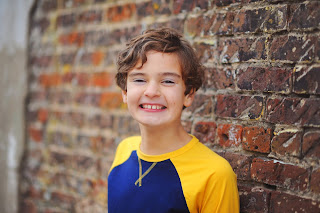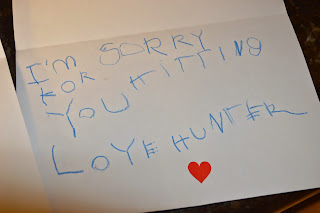The waiting game
Paige's class has had little eggs in the incubator for the past couple of weeks. The kids were restless, waiting to see the new chicks. The teachers even had a live web stream from the classroom over the weekend, so we could check in on the progress of the little baby chicks soon to join the world. Monday morning, they walked in to several cute, little, furry chicks! The kids were so excited, and the teachers invited the families to come up after school to see the little ones.
The waiting game is so hard for children, and just as hard for adults. Normally, I am terrible about checking my voicemail- I tend to forget that I have messages. These last few days, I have been checking in repeatedly in case I miss a call from Dr. G. Today is one week post blood draw. They told me we would have results within 10-14 days. Hoping for a call early next week.
My parent training in the IOP yesterday helped answer several questions that have been going through my mind lately. We discussed treatment options if 1) the test result contained the antibody 2) it was negative..what was the next step?? It is so helpful to talk out loud with a professional who has been working with kids with Autism for the past fifteen years...and here are the key points she made.
--Hunter is not like a typical child with Autism. When he gets angry, it is an instantaneous reaction. Even if the topography is the same (each environment, consequence, etc), she said he almost seems like he doesn't have motor control of his limbs (which would fit in the NMDA category).
--Extreme behaviors typically come from years of shaping. So for example, the child screams in line for candy at the store, and the parent gets tired of the yelling, so they give in and buy the candy, forever imprinting the factors involved for that child to get whatever they want. She said the behaviors shouldn't happen overnight- and with Hunter, they have. We do not give in to him, either. It doesn't matter what kind of scene we create, we never, ever give in and get a wanted tangible from undesirable behaviors.
--Hunter's VB-MAPP (assessment tool for ABA therapy) is almost complete. By the time all of the boxes are coded in (which his almost all are), you should be looking pretty close to normal. Hunter, post strep, is not. You can still have barriers that affect your behavior (instructional control, motivators, etc), but the barriers shouldn't be coded as the highest number at this point.
--OCD tendencies can be seen within Autism, but obsessions like Hunter's are not typical. The OCD, however, is inherent in PANDAS. If Hunter didn't obsess about the phone and ipad, we would have half of the amount of issues we do. He just gets "stuck" and it was very difficult to retrieve him from the moment.
--Downtime is hardest for children with Autism, because unlike a typical child, kiddos on the spectrum don't really know how to "play." Learning to build his repertoire of toys has been a main goal for in-home as well as IOP.
--Autism is diagnosed by the behaviors; it doesn't matter the etiology of it. For example, a child with Down Syndrome could have autistic like tendencies, but that doesn't mean he has to have a label of Autism as well. So as long as Hunter keeps the behaviors that are currently present, the label will remain.
The best part of the training was listening to her, another professional, validate that Hunter is not a typical case. She said she truly believes in the medical component b/c of his severe regression across the board after the strep, in all different environments. Typically, if a child will regress, it will be in one environment, because the variables have changed (ex. one parent starts giving in, etc). His arm flapping is not typical, either, because most "flappers" are lower functioning kiddos who don't know what to do instead of the hand flap. Once the child is taught the play skills they were missing, you typically see the reduction in stimulatory behaviors. She said that Hunter has "beautiful play skills;" however, he only flaps in excitement or anxiety.
Glad to have a busy weekend planned; harder to obsess about results when you are running all over town. Next week we also have the nutritional review on Thursday to see if he is deficient in any areas and the biomedical intervention plan.
Looking forward to the upcoming week.
 |
| Checking out the little baby chicks! |
The waiting game is so hard for children, and just as hard for adults. Normally, I am terrible about checking my voicemail- I tend to forget that I have messages. These last few days, I have been checking in repeatedly in case I miss a call from Dr. G. Today is one week post blood draw. They told me we would have results within 10-14 days. Hoping for a call early next week.
My parent training in the IOP yesterday helped answer several questions that have been going through my mind lately. We discussed treatment options if 1) the test result contained the antibody 2) it was negative..what was the next step?? It is so helpful to talk out loud with a professional who has been working with kids with Autism for the past fifteen years...and here are the key points she made.
--Hunter is not like a typical child with Autism. When he gets angry, it is an instantaneous reaction. Even if the topography is the same (each environment, consequence, etc), she said he almost seems like he doesn't have motor control of his limbs (which would fit in the NMDA category).
--Extreme behaviors typically come from years of shaping. So for example, the child screams in line for candy at the store, and the parent gets tired of the yelling, so they give in and buy the candy, forever imprinting the factors involved for that child to get whatever they want. She said the behaviors shouldn't happen overnight- and with Hunter, they have. We do not give in to him, either. It doesn't matter what kind of scene we create, we never, ever give in and get a wanted tangible from undesirable behaviors.
--Hunter's VB-MAPP (assessment tool for ABA therapy) is almost complete. By the time all of the boxes are coded in (which his almost all are), you should be looking pretty close to normal. Hunter, post strep, is not. You can still have barriers that affect your behavior (instructional control, motivators, etc), but the barriers shouldn't be coded as the highest number at this point.
--OCD tendencies can be seen within Autism, but obsessions like Hunter's are not typical. The OCD, however, is inherent in PANDAS. If Hunter didn't obsess about the phone and ipad, we would have half of the amount of issues we do. He just gets "stuck" and it was very difficult to retrieve him from the moment.
--Downtime is hardest for children with Autism, because unlike a typical child, kiddos on the spectrum don't really know how to "play." Learning to build his repertoire of toys has been a main goal for in-home as well as IOP.
--Autism is diagnosed by the behaviors; it doesn't matter the etiology of it. For example, a child with Down Syndrome could have autistic like tendencies, but that doesn't mean he has to have a label of Autism as well. So as long as Hunter keeps the behaviors that are currently present, the label will remain.
The best part of the training was listening to her, another professional, validate that Hunter is not a typical case. She said she truly believes in the medical component b/c of his severe regression across the board after the strep, in all different environments. Typically, if a child will regress, it will be in one environment, because the variables have changed (ex. one parent starts giving in, etc). His arm flapping is not typical, either, because most "flappers" are lower functioning kiddos who don't know what to do instead of the hand flap. Once the child is taught the play skills they were missing, you typically see the reduction in stimulatory behaviors. She said that Hunter has "beautiful play skills;" however, he only flaps in excitement or anxiety.
Glad to have a busy weekend planned; harder to obsess about results when you are running all over town. Next week we also have the nutritional review on Thursday to see if he is deficient in any areas and the biomedical intervention plan.
Looking forward to the upcoming week.




Comments
Post a Comment